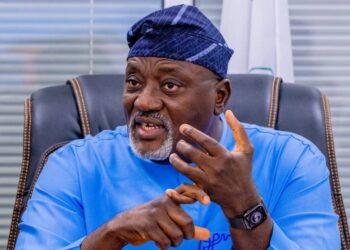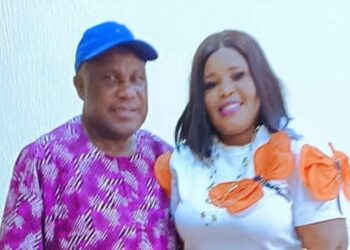By Obafemi Oluwadare, PhD
Brian Tracy, the famous motivational speaker, said the true test of leadership is how well one functions in a crisis. Throughout history, crises have been the breeding ground for individuals we later describe as great leaders, and in many instances when time makes the leader, such a leader would emerge from unlikely places. While we celebrate individuals such as Lincoln, Churchill, Nelson Mandela, Barack Obama, to mention just a few, we should also not forget that great leaders can equally appear on smaller stages.
Politics, like science, depends on our ability to persuade each other of common aims based on a common reality. In today’s Nigeria, resilience is the leadership virtue we require. We must look for someone resilient enough to lead us without giving excuses; someone with a compulsive tendency to see both sides of any issue without demonizing opponents. The three traits that should characterise the mind of our next president are Challenge, Personal control and Commitment.
The talk of who should succeed President Muhammadu Buhari come 2023 is now renting the air. I posit that the talk should not leave out the present Governor of Ekiti who doubles as the Chairman of Nigeria Governor’s Forum, Dr John Kayode Fayemi. He will be winding down his second term in office gallantly and graciously later this year. As bridge-builder par excellence, he should neither dither nor detour from throwing himself into the ring to give his best claim to the exalted position.
An understanding of how Dr Fayemi has been outstandingly trudging on, with the responsibilities of Ekiti on his head amidst the Covid-19 pandemic ravaging the whole world and with very limited resources to throw at it, will surely make one understand where he is coming from and what type of leadership he is capable of providing in this new era.
Today, the competencies required are different from standard operating leadership protocols. We have entered the age of empowered individuals. That is, leaders who can affect the system positively, rather than the system affecting them negatively; leaders who can use potent new technologies and harness social media to organize themselves and focus interest on their agendas and activities. It is simply about managing crises and navigating through feelings of anxiety, hopelessness, and doom.
The office of a president has grown beyond what it used to be, in power, scope, complexity and degree of difficulty. Now, more than ever, it requires someone who is futuristic and highly dynamic. The emotional burden of the responsibilities is even something else. The president must be ready to operate like a computer, which is the only way he can endure the relentless scrutiny of the digital age.
We need a cross-generational person like Fayemi as our next president in 2023. Someone who appeals to the old and young, male and female, who cuts across ethnicity and religious boundaries, who holds liberal views as against the orthodox ones. Liberalism in this sense pertains to those arts and sciences, the study of which is considered worthy of a free man as opposed to servile and mechanical. The opposite is orthodoxy, which conforms to the established, accepted or traditional doctrines of a given ideology, faith or religion.
Fayemi should run, not to bolster his ego, He should run, not because he simply wants to be addressed as Mr President. He should run, not to light his pockets. Rather, he should run for his age, he should run for his democratic credence and he should run for the good of Nigeria. The prayer of millions of Nigerians is that Nigeria’s next president should either be Dr John Kayode Fayemi or someone of his stature.
Yes, Nigerians are yearning for a not-too-young person like Fayemi, vibrant enough to steer the country out of its current quagmire. The presidential villa is not an old persons’ home, a sick bay or a place for persons with critical health challenges. The demands of the office are too serious for a sick person. Anyone who wants to be president must first take care of his health challenges. Nigerians are entitled to an objective assessment and knowledge of the state of the health of anyone aspiring to that office.
The pattern as we approach 2023, must not be such that the president feels a sense of entitlement from the country and from the people for a favour, real or imagined, that he may have done in the past. Rather, such a person must have a sense of indebtedness towards the country and the people. He must see himself as coming to serve and pay his dues; somebody threw up by circumstances.
Fayemi has a clairvoyant brain. He has the faculty capable of perceiving things or events in future or beyond sensory contact. Nigeria towards 2023 is looking beyond a president whose only claim to power is being a political heavyweight. Unlike in the past, oration or political sagacity would not just be good enough. Even the foisted role of Commander in Chief is becoming weightier than ever before. Natural security is today being threatened by stateless terror groups. Rare is the day when in Nigeria, one or more of those enemies don’t present an imminent danger, requiring the president’s utmost attention.
There are two ways to get ahead. You can dominate people by making them fear you or you can win their loyalty with your intelligence and kindness. A dominant leader tends to adopt a stereotypical power pose, intimidating people into following him. A non-dominant leader does not look down with a scowl. Rather, he would look up with a smile of humility. The non-dominant leader doesn’t flaunt what he knows. He appears to take up less space, yet he is capable of attracting people to his care and competence rather than dominating them. He gains followers through prestige, which he has developed by demonstrating his expertise and helping people to solve knotty problems. The latter is the Fayemi we are talking about.
So, as we scout for a president towards post-pandemic 2023, We must think of what the new normal holds in stock for us. We don’t want those who flaunt the credentials of having risen through dominating others, who physically take up a lot of space and often brag about who they have helped. We must consider those who rely on the prestige of what they are capable of doing and they can easily be spotted by their less expansive yet resilient posture.
Fayemi is a bold risk-taker and this is a strong quality of a resilient individual. It is easy for most individuals to be stuck in a rut in which they continue to conduct work in the same way from year to year. That approach works well until the world changes, requiring them to change or die. We will not find Fayemi among this lot.
Fayemi loves to develop others. Like most resilient leaders, he is not only interested in his own development but is concerned about the development of others. His type of resilience is needed when we encounter failure. Developing others the way Fayemi does, helps everyone to learn from their mistakes. We continue to find that leaders who want feedback for themselves are more likely to give productive feedback and coaching to others because they want honest feedback as well. That is Fayemi for you.
Fayemi is a champion of change. Change takes courage and requires a vision about where the people are going. A resilient leader like Fayemi is willing to change and able to provide the leadership to ensure that the followers also change.
Fayemi is a decisive leader. He is swift and resolute. Making decisions is always difficult because no person has all the data or understands all eventualities. But the people cannot move forward until a decision gets made. The most resilient leaders are effective at making decisions and moving forward. If they make the wrong decision, they are quick to make a different decision and move in another direction. The proverb by Cato “swift and resolute action leads to success; self-doubt is a prelude to disaster” fits well here. And Fayemi fits perfectly in.
Regarding Fayemi, the most objective verdict any reasonable observer can give is that while he still has plenty to do, he is gone so far doing superbly well in meeting those parameters that Nigerians can set for their next president. He is not a reckless leader. He is extremely precautious. He sees failures as temporary setbacks people can recover from quickly. He maintains a positive attitude and a strong sense of opportunity during periods of turbulence. When faced with ambiguity, Fayemi as a resilient leader finds ways to move forward and avoids getting stuck.
Dr Fayemi communicates powerfully and transparently. He is ever willing to help others understand a new strategy or direction. His effective communication in the past has helped others to understand changes, expectations and new directions. Dr Fayemi has proven to be both humble and coachable by persons and circumstances. He has a strong desire to continuously improve his skills and abilities.
By building trust and being open to differences, Fayemi has been able to create strong ties. Ask those who know him well, and they will tell you that he is not doing badly in this area.
Lastly but not least, Fayemi is a champion of change. The kind of change Nigerians needs going forward. Changes in a micro and macro sense have created an impetus towards a new human age by moving countries away from known social and economic structures. In other words, it will not be business as usual with Fayemi as Nigeria’s next President.
*Oluwadare writes as a Public-Affairs analyst.










